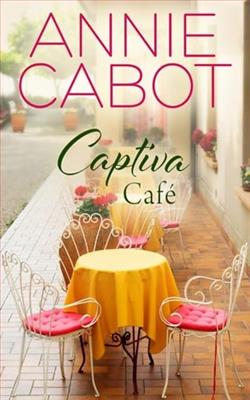
Captiva Café
by Annie Cabot
“Loving someone and caring for them doesn’t require erasing yourself in the process.”
On the sun-drenched shores of Florida’s Captiva Island, Maggie Moretti’s Key Lime Garden Inn has become a sanctuary for those seeking a fresh start.
When Merritt Ryan arrives with a guitar case and a heart heavy with secrets—a canceled wedding and a terminally ill mother back in Maine, she never expects to find healing among the island’s gentle rhythms and open-hearted residents.
Lauren and her family finally move to Florida, but not without internal struggles that threaten her relationship with Maggie.
Meanwhile, the construction of the Captiva Café brings unexpected discoveries for co-owners Isabelle and Gretchen, as archaeological finds beneath the floorboards create both complications and connections.
As their paths intertwine with Maggie’s YouTube-famous mother, a reluctantly romantic newspaper editor, and a community that embraces second chances, these women discover that life’s most meaningful journeys often begin when carefully laid plans fall apart.
Captiva Café is a heartwarming story about the courage to choose yourself, the healing power of community, and the endless possibility of beginning again—at any age.
.
Read
Captiva Café on http://kissnovel.net
Martial Peak Reviews
Annie Cabot's Captiva Café is a beautifully woven tapestry of human emotions, resilience, and the power of community. Set against the idyllic backdrop of Captiva Island, Florida, the novel invites readers into a world where the sun-drenched beaches and gentle ocean breezes serve as both a setting and a metaphor for healing and renewal.
The narrative centers around Maggie Moretti and her Key Lime Garden Inn, a place that has become a refuge for those seeking a fresh start. Maggie herself is a compelling character, embodying the warmth and wisdom of someone who has seen life's ups and downs and emerged stronger. Her inn is not just a business; it is a sanctuary where people come to find themselves, and in doing so, they often find each other.
One of the novel's most poignant storylines involves Merritt Ryan, a woman burdened with the weight of a canceled wedding and the impending loss of her mother to a terminal illness. Merritt's journey is one of self-discovery and healing, and Cabot handles her character with a delicate touch, allowing readers to feel her pain and her gradual transformation. The island's gentle rhythms and the open-hearted residents provide Merritt with the space she needs to confront her past and embrace her future.
In contrast, we have Lauren, who moves to Florida with her family, bringing with her a set of internal struggles that threaten her relationship with Maggie. Lauren's story is a testament to the complexities of human relationships and the courage it takes to confront one's own demons. Cabot skillfully navigates these intricacies, offering a narrative that is both relatable and deeply moving.
The subplot involving Isabelle and Gretchen, co-owners of the Captiva Café, adds an intriguing layer to the story. The archaeological finds beneath the café's floorboards serve as a metaphor for the hidden depths within each character. These discoveries create both complications and connections, illustrating how the past can influence the present in unexpected ways. Cabot's ability to intertwine these narratives is a testament to her skill as a storyteller.
One of the novel's standout features is its exploration of the theme of choosing oneself. The quote from the blurb, “Loving someone and caring for them doesn’t require erasing yourself in the process,” resonates throughout the book. Each character, in their own way, learns the importance of self-love and the courage it takes to prioritize one's own needs without guilt or regret. This theme is universal and timeless, making the novel accessible to readers of all ages.
Cabot's writing is both lyrical and evocative, painting vivid pictures of Captiva Island's natural beauty. Her descriptions of the island's landscapes are so immersive that readers can almost feel the sand between their toes and hear the waves crashing on the shore. This attention to detail enhances the overall impact of the story, making it not just a narrative but an experience.
In terms of character development, Cabot excels in creating multi-dimensional characters who are flawed yet endearing. Each character's journey is unique, yet they are all bound by a common thread of seeking redemption and renewal. The interactions between the characters are authentic and heartfelt, adding depth to the narrative.
Comparatively, Captiva Café shares thematic similarities with works like Kristin Hannah's The Great Alone and Elin Hilderbrand's Summer of '69, both of which explore themes of personal growth and the healing power of community. However, Cabot's novel stands out for its focus on the courage to choose oneself and the endless possibilities of beginning again, regardless of age.
Overall, Captiva Café is a heartwarming and inspiring read that will resonate with anyone who has ever faced life's challenges and emerged stronger. It is a celebration of the human spirit and a reminder that life's most meaningful journeys often begin when carefully laid plans fall apart. Annie Cabot has crafted a novel that is both a comforting escape and a profound exploration of life's complexities.
For those looking to immerse themselves in a story of hope, healing, and second chances, Captiva Café is a must-read. It is a testament to the power of community and the courage it takes to embrace change and start anew.








![Subscribed to GodTube [Official]](/upload/pic/manga/subscribed-to-godtube--official-.jpg)















Reviews 0
Post a Reviews: